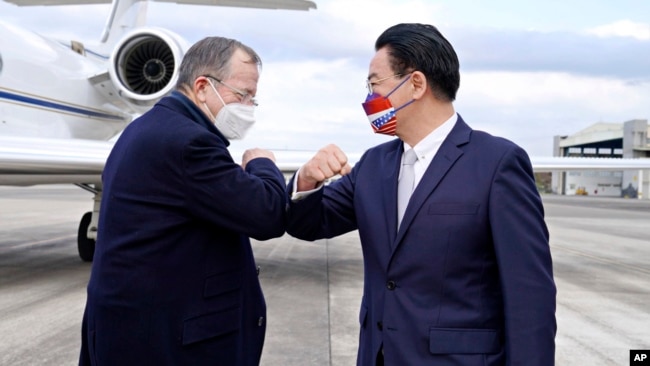先日のVOAニュースからすると、一般市民や有識者は有事を現実的でないとする一方、政府関係者は有事を睨み緊張感を持っていることの現れなのでしょうか。
情報発信は警告としては重要なこととも思いますが、かえって追い込んで誘発しているようにも見えなくもありません。
歴史は何十年か先にならないと判明しないものです。それでもなお立場、捉え方により歴史は揺らぎます。
しかし一つ言えることは、世界にとって価値ある国でなければ、誰も助けてはくれないということ!!
それを台湾は私たちに教えてくれています。
VOAで英語を学び世界の今を考えましょう!!
米国代表団が台湾に到着、中国が訪問を糾弾(和訳)
US Delegation Arrives in Taiwan, China Denounces VisitMarch 02,2022
ジョー・バイデン大統領が派遣した米国の元国防・安全保障高官一行は、火曜日に台湾に到着しました。
この訪問は中国によって非難されており、ロシアがウクライナに侵攻している最中での出来事です。
訪問を率いるのは、元米軍トップのマイク・マレン氏。台湾が警戒レベルを上げている時に行われます。台湾は、西側諸国が東欧での出来事に気を取られているため、中国が自国に対して動き出す可能性があると懸念しています。
マレン氏は、ジョージ・W・ブッシュ前大統領とバラク・オバマ前大統領の下で米軍トップを務めた退役海軍司令官です。ブッシュ政権下で国家安全保障担当副顧問を務めたメーガン・オサリバン氏と、オバマ政権下で国防次官を務めたミシェル・フロノイ氏が参加しています。また、元国家安全保障会議アジア担当上級部長2名もメンバーとして参加します。
台湾のジョセフ・ウー外務大臣は、一行が台北に到着した際に出迎えました。
蔡英文氏は台湾の総統です。彼女の政府機関はロイターに対し、今回の訪問により”様々な分野における米台協力問題について深い意見交換ができるだろう”と述べています。
台湾は、双方が”米台関係の着実な発展を引き続き深め、地域の平和と安定を引き続き共同で維持し、世界の平和と繁栄に引き続き共同で貢献する”ことを望んでいると声明で述べられました。
米国の一行は水曜日に蔡氏と会談し、同じ日にマイク・ポンペオ前国務長官が到着する予定です。ポンペオ氏は私人として別途やってきます。
中国は台湾を米国との関係で最も重要な問題と位置づけています。中国は、両者のハイレベルな会談に怒りを感じています。
「我が国の主権と領土を守るという中国人民の意志は揺るぎないものである。米国が台湾への支持を示すために誰を送り込もうと、失敗するに決まっている。」と中国外務省の報道官は述べました。
ロシアのウクライナ侵攻は、中国が民主的な台湾を武力で制圧すると脅していることに注目されました。中国は同島を自国領土と主張しています。
しかし、この2つの状況は大きく異なっています。台湾は中国本土から台湾海峡を挟んで160kmの距離にあります。また、台湾は米国から強い支持を受けており、米国は台湾の自衛を確保することを法的に義務付けられています。
中国は、ロシアのウクライナ戦争を糾弾していません。また、ロシアに対する制裁を批判しています。この2国は米国や西ヨーロッパに対する抵抗感を共有しています。
中国はほぼ毎日、台湾の防空圏に軍用機を送り込んでいます。そして土曜日、中国国防省はアメリカの軍艦が台湾海峡を通過することに抗議しました。
この海峡は国際水域です。米海軍は、この艦船の通過は”自由で開かれたインド太平洋に対する米国のコミットメントを示すものだ”と述べています。
中国はしばしば、米国と台湾政府との接触に抗議しています。11月には、台湾海峡の方角で軍が航空・海軍の活動を行ったと発表しました。これは、5人の米国議員と蔡氏の1日だけの抜き打ち訪問後のことでした。
バイデン氏は過去の大統領と同様、台湾との接触を深めています。彼の政権はまた、台湾に軍備を売っています。
US Delegation Arrives in Taiwan, China Denounces Visit
A group of former senior United States defense and security officials sent by President Joe Biden arrived in Taiwan on Tuesday.
The visit has been denounced by China and is happening in the middle of Russia's invasion of Ukraine.
The visit is led by Mike Mullen, a former top U.S. military officer. It comes at a time when Taiwan has raised its alert level. Taiwan is worried China could move against it as the West is distracted with the events in Eastern Europe.
Mullen is a retired Navy commander who served as the top U.S. military officer under former presidents George W. Bush and Barack Obama. He is joined by Meghan O'Sullivan, a former deputy national security adviser under Bush, and Michele Flournoy, a former undersecretary of defense under Obama. Two former National Security Council senior directors for Asia are also part of the group.
Taiwanese Minister of Foreign Affairs Joseph Wu met the group when it arrived in Taipei.
Tsai Ing-wen is the president of Taiwan. Her office told Reuters the visit would permit “an in-depth exchange of views on Taiwan-U.S. cooperation issues in various fields.”
Taiwan hopes the sides will “continue to deepen the steady development of Taiwan-U.S. relations, continue to jointly maintain regional peace and stability, and continue to jointly contribute to global peace and prosperity,” it said in a statement.
The American group will meet Tsai on Wednesday, the same day former U.S. Secretary of State Mike Pompeo will arrive. Pompeo is coming separately as a private citizen.
China describes Taiwan as the most important issue in its ties with the United States. China is angered by any high-level meetings between the two.
"The will of the Chinese people to defend our country's sovereignty and territorial integrity is immovable. Whoever United States sends to show support for Taiwan is bound to fail," said a Chinese Foreign Ministry spokesperson.
Russia’s invasion of Ukraine has drawn attention to China’s threat to use force to take over democratic Taiwan. China claims the island as its own territory.
The two situations are very different, however. Taiwan lies 160 kilometers across the Taiwan Strait from mainland China. It also enjoys strong support from the U.S., which is legally required to make sure the island can defend itself.
China has not denounced Russia’s war against Ukraine. It has also criticized the use of sanctions against Russia. The two countries share a feeling of resistance towards the U.S. and Western Europe.
China has been sending military airplanes into Taiwan’s air defense zone almost every day. And on Saturday, China’s Defense Ministry protested the passage of an American warship through the Taiwan Strait.
The strait is in international waters. The U.S. Navy said the ship’s passage “demonstrates the United States’ commitment to a free and open Indo-Pacific.”
China often protests U.S. contacts with Taiwan’s government. It announced in November that its military conducted air and naval activities in the direction of the Taiwan Strait. This came after five U.S. lawmakers met with Tsai on an unannounced one-day visit.
Biden, like past presidents, is making more contacts with Taiwan. His administration is also selling it military equipment.
Words in This Story
distract — v. to cause to stop thinking about or paying attention to someone or something and to think about or pay attention to someone or something else instead
region — n. a part of a country, of the world, etc., that is different or separate from other parts in some way
stability — n. the quality or state of something that is not easily changed or likely to change
prosperity — n. the state of being successful usually by making a lot of money
sovereignty— n. country's independent authority and the right to govern itself
integrity— n. the quality of being honest and fair
sanction — n. an action that is taken or an order that is given to force a country to obey international laws by limiting or stopping trade with that country, by not allowing economic aid for that country, etc.
commitment – n. a promise to do or give something
